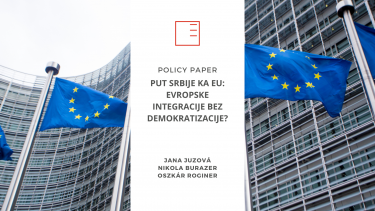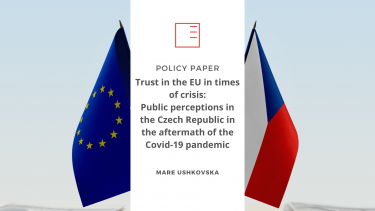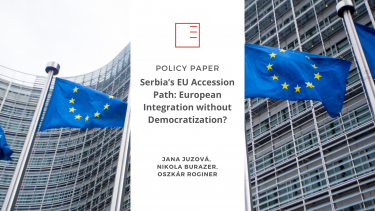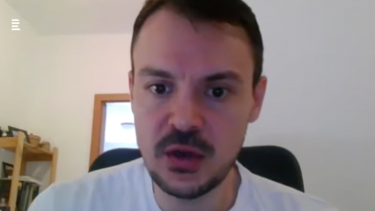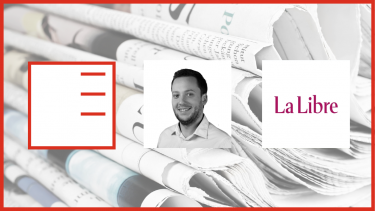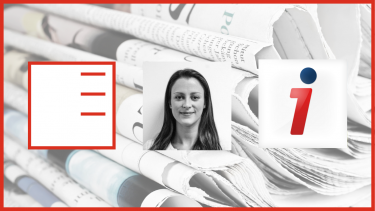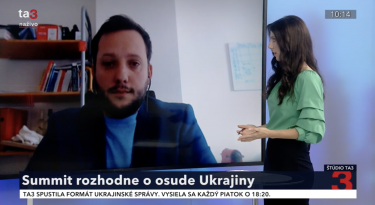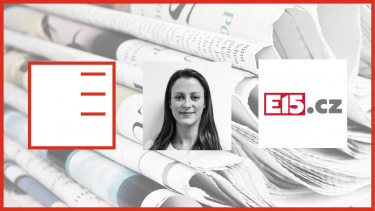EU MONITOR | THREE RESPONSES TO DISINFORMATION IN THE EUROPEAN UNION
Disinformation and foreign interference have been concerns in global politics for centuries, but social media algorithms have made the current threat more dire as they amplify content based on human frailties such as our obsession with negativity and outrage. Russian interference in the 2016 US federal election and other elections and referenda in at least twenty countries between November 2016 and April 2019, including the Brexit referendum, the French and German elections, and the Ukrainian power grid cyber-attacks, have highlighted the potential for foreign governments to alter the results of an election or undermine democracies using social media and other means. Writes Jakub Ferenčík in his last EU MONITOR.
Show more PDF
Policy Paper | PUT SRBIJE KA EU: EVROPSKE INTEGRACIJE BEZ DEMOKRATIZACIJE?
Is Serbia succeeding in meeting the conditions for EU accession? Read the Policy Paper co-written by Jana Juzová, Nikola Burazer and Oszkár Roginer on Serbia's path to EU membership. The policy paper is written in Serbian.
Show more PDF
Policy Paper | Trust in the EU in times of crisis: Public perceptions in the Czech Republic in the aftermath of the Covid-19 pandemic
How has the Covid-19 pandemic affected the Czechs' relationship with the European Union? This topic is addressed in a policy paper by visiting fellow Mare Ushkovska.
Show morePolicy Paper | Serbia’s EU Accession Path: European Integration without Democratization?
Is Serbia succeeding in meeting the conditions for EU accession? Read the Policy Paper co-written by Jana Juzová, Nikola Burazer and Oszkár Roginer on Serbia's path to EU membership.
Show more PDF

Blog | New Hope on the Horizon? The Belgrade-Pristina Dialogue and the European Union's Struggle Towards a Diplomatic Victory
In her blog, our intern Barbora Volkova discusses the new Franco-German proposal regarding the Kosovo-Serbia disputes. She analyses what this initiative entails and what relevance it may have for the accession negotiations within the European Union.
Show more PDFČRo Plus: Serbs don't want to join the EU. According to ordinary people, it would be collusion with other corrupt countries
What attitude Serbian citizens have towards EU membership, why they have a "rational attitude" towards it and what their historical ties to Russia are, is the topic of our associate research fellow Marko Stojić's commentary for Czech Radio Plus.
Show more
LA LIBRE: Reputedly Eurosceptic, the Czech Republic is trimming its European suit
Our research fellow Žiga Faktor commented for the Belgian daily La Libre on the topic of Czech Euroscepticism. The positive attitude of Václav Havel (the so-called great European) towards Europe was also reflected in the incoming Czech presidency, specifically in the motto "Europe as a task". The motto is inspired by his speech in Cácy in 1996. Despite a positive attitude in the past, according to the latest data from STEM, only 33 % of Czechs have a positive view of the Czech Republic's EU membership.
Show more
iDnes.cz: Ukraine's invitation to the EU spoils the bitterness of unfulfilled promises to the Balkans
The news server iDnes.cz published a commentary by our Senior Research Fellow Jana Juzová. In her commentary, she discusses Ukraine's candidate status and compares it with the situation in the Balkans, where some countries have been waiting for EU membership for decades.
Show moreTA3: Summit to decide Ukraine's fate
The head of our Brussels office, Žiga Faktor, in an interview for TA3 commented on Ukraine's possible membership in the European Union and the related views of the member states. The original critics of enlargement are now beginning to show support, but status alone is no guarantee of certain membership. What is the decisive factor at the moment?
Show more
E15: Candidate status is just a gesture. Ukraine will join the European Union decades from now
Senior Research Fellow Jana Juzová commented for E15.cz on the topic of Ukraine's EU membership. The launch of the accession process was supported by the European Commission, but also by some EU member states - for example, Germany, France, Italy and, of course, the Czech Republic.
Show moreStaroměstské náměstí 4/1
Prague 1 - Staré Město
110 00
tel.: +420 212 246 552
email: europeum@europeum.org
https://www.europeum.org

